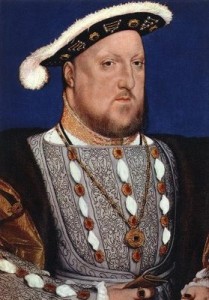 On Tuesday 9th May 1536, Henry VIII wrote to Thomas Cromwell from Westminster Palace “Commanding him to repair to the King to treat of matters relating to the surety of his person, his honor, and the tranquillity of the realm”1 No detail is given regarding the matters to be discussed.
On Tuesday 9th May 1536, Henry VIII wrote to Thomas Cromwell from Westminster Palace “Commanding him to repair to the King to treat of matters relating to the surety of his person, his honor, and the tranquillity of the realm”1 No detail is given regarding the matters to be discussed.
On the very same day, the King summoned a number of noblemen and gentlemen to a council meeting. A record in Letters and Papers gives the names of those summoned:
“Noblemen [to be summoned to a Council ?]
My lord of Norfolk, my lord of Suffolk, marquis of Exeter. Earls of Oxford, Arundel, Westmoreland, Essex, Derby, Worcester, Sussex, Huntingdon. Lords Lawarre, Awdeley, Montague, Matravers, Morley, Cobbeham, Clynton, Powes, Sandes, Wyndesor, and Mordaunt.
P. 1. Endd.: Names of divers lords.
R. O. 2. A list of gentlemen, probably drawn up the same time as the preceding.
Sir Anthony B[rowne], Sir John Russell, Sir Wm. Kyngeston, Sir John Gage, Sir John Dudley, Peter Mewtas, Ant. Kyngeston, Sir John Seyntlowe, Sir Rice Maunsell, John Salisbery, Sir Wm. Brereton, Ric. Candisshe, Mr. Gostwike, Mr. Williams, Mr. Wriothesley, Raff Sadlier, Mr. Palmer, knight porter of Calais, Sir Wm. Pikeryng, Philip Denys, John Pye, Mr. Coffen, Mr. Barmeston, John Carre, Sir Edmond Bedyngfeld, Sir Edw. Chamberlayne, Wm. Gunson.
P. 1. Endd.: [Names] of divers [gente]lmen.”2
There is no way of us knowing what was due to be discussed, but it is highly likely that Anne Boleyn, and the King’s marriage to her, would have been the main topics of conversation.
Meanwhile, the justices of the King’s Bench were ordering the sheriffs of London to assemble a grand jury at Westminster the following day to rule on offences alleged to have taken place in Middlesex (at Whitehall and Hampton Court Palace). The Baga de Secretis lists forty-eight members of the ‘Grand Jury panel for Middlesex” and the list, which is published in the appendix of Wriothesley’s Chronicle has dots in the margin to show the names of those who appeared, “and the contracted word ” jur.” is written against those who were sworn”:
“. Egidius Heron, armiger, jur.
. Rogerus More, armiger, jur.
. Ricardus Awrisham, ar. jur.
. Thomas Byllyngton, ar. jur.
. Gregorius Lovell, ar. jur.
. Johannes Worsope, ar. jur.
Ricardus Harryyong, ar.
Jesper Leylce, ar.
. Willelmus Gooddard, gent. jur.
. Willelmus Blakwall, gent. jur.
. Johannes Wylford, gent. jur.
. Willelmus Berd, gent. jur.
Robertas Wheler, gent.
. Henricus Hubbylthorn, gent. jur.
. Willelmus Hunnyng,- gent, jur.
. Robertus Walys, gent. jur.
Willelmus Hollys, gent.
. Johannes Englond, gent. jur.
Willelmus Warner, gent.
Thomas Curtys, gent.
. Henricus Lodysman, gent. jur.
. Johannes Averey, gent. jur.
. Thomas Burnell, gent.
. Ricardus Callard, gent.
Georgius Aleyn, gent.
. Johannes Elryngton, gent.
. Thomas Hemmyng, gent.
. Ricardus Bellamy, gent.
. Willielmus Goodere, gent.
Johannes Hone, gent.
. Robertus Smalwod, gent.
. Willelmus Jenyns, gent.
. Johannes Jamys, gent.
. Thomas Sylvester, gent.
. Johannes Chanterell, gent.
. Ricardus Clark, gent.
Johannes Grymston, gent.
Robertus Redman, gent.
. Johannes Rawson, gent.
. Ricardus Ive, gent.
. Johannes Willoughby, gent.
Ricardus Brown, gent.
. Johannes Ederick de Edgeware, gent.
. Alanus Nicoll, gent.
. Willelmus Russell, gent.
. Robertus Sherp, gent.
.Willelmus Snelson, gent.
Johannes Nicoll de Dolstrete.”3
(Note: The Baga de Secretis is in Latin, hence the use of “Johannes” for John etc.)
The Middlesex grand jury was set to meet on 10th May to rule on whether there was sufficient evidence to suggest that the accused were guilty of the alleged crimes, that they should be indicted and should undergo trial by jury, so we can deduce that Thomas Cromwell was certain that he had gathered enough evidence against Anne Boleyn and the five men. How quickly things had happened! Anne had only been arrested on 2nd May.
Notes and Sources
- LP x. 833
- Ibid., 834
- From the Baga de Secretis Pouch VIII published in the Appendix of A chronicle of England during the reigns of the Tudors, from A.D. 1485 to 1559 by Charles Wriothesley, p198-200. Available online at http://www.archive.org/stream/chronicleengland00wriouoft#page/198/mode/2up